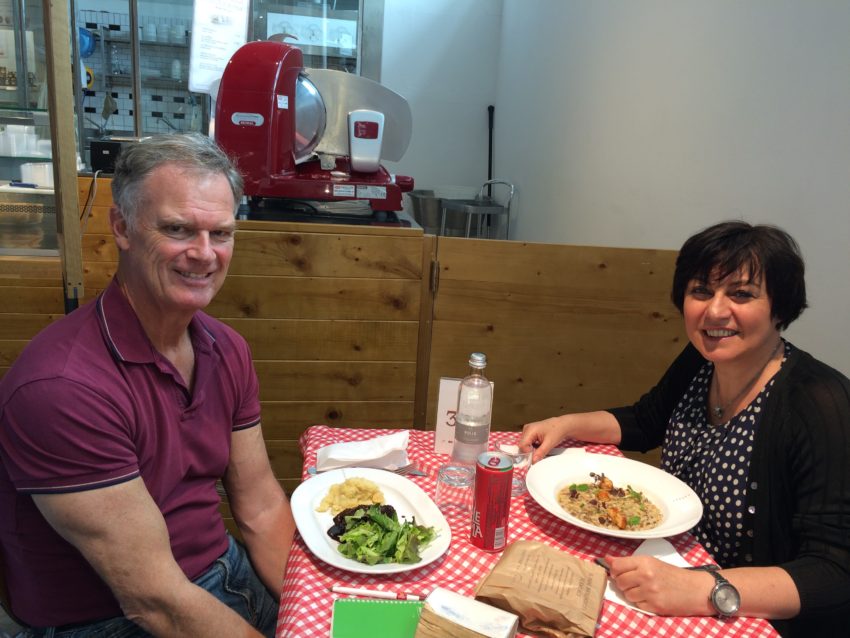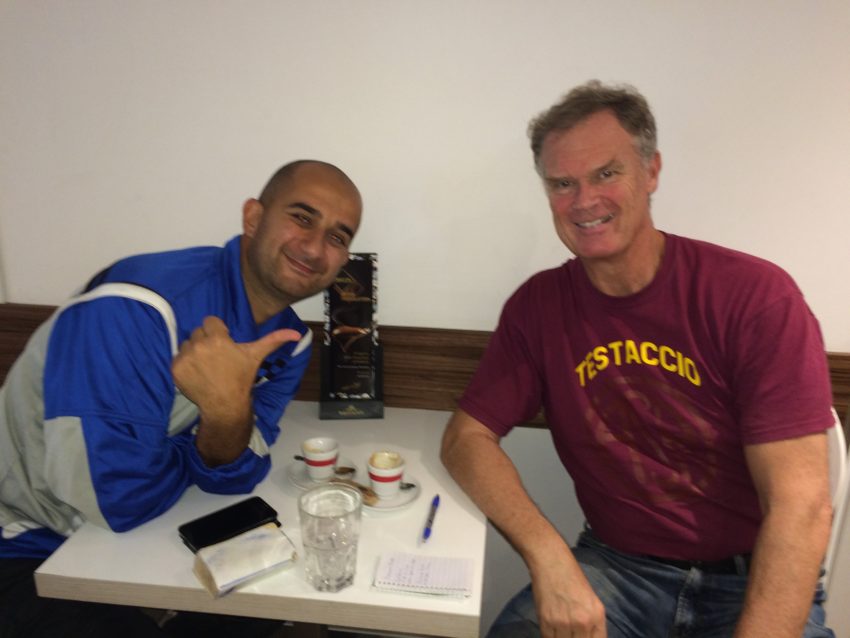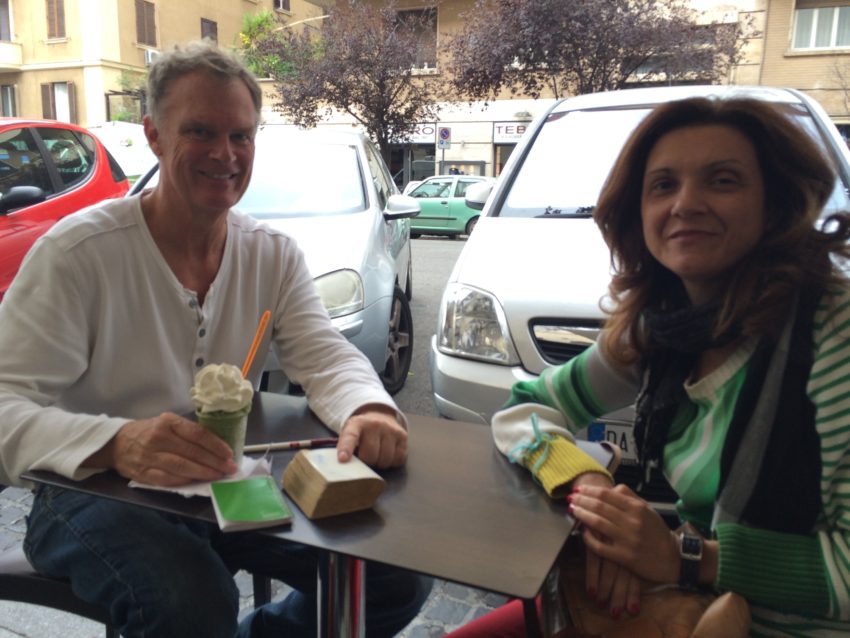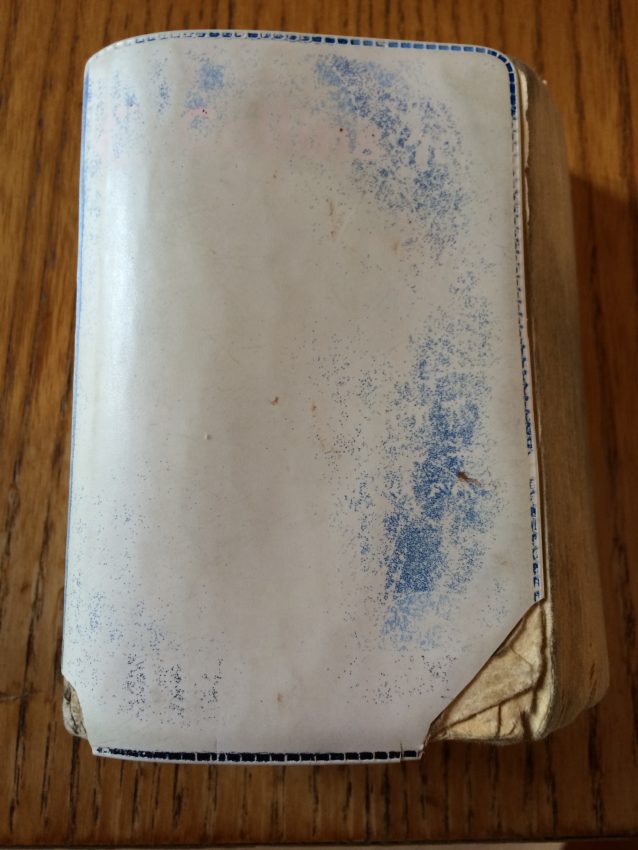Scambios are ideal way to learn Italian — but careful how you say it
(I’m traveling. Below is a reprint from 2015)

The sun had long since set in Rome and that dark, crisp period right before dinner time settles into the most romantic city on earth. It’s the time when Romans sit in cozy enotecas, known in North America as wine bars, and warm themselves with good wine and conversation. I was sitting with a gorgeous Italian woman who could’ve passed for Sophia Loren in her early 30s. Long, curly, coal black hair, olive complexion and eyes right off a new-born doe. We were sitting in Del Frate, a dim enoteca near the Vatican so romantic you could fall in love with a mannequin. We were talking Italian and she was asking me about my former job as a sportswriter. She asked me if I played sports when I was younger. I tried to say, in Italian, “I was a lousy athlete.” But, instead, I screwed up the noun and the tense and instead of saying, “I was a lousy athlete” I said …
… “I’m lousy in bed.”
Fortunately, this wasn’t a date. It’s why I didn’t take offense to her — and every other beautiful woman within earshot of our table — laughing so hard. I kind of wondered how Italian women knew I hit only .236 my senior year in high school, but I wondered more how I messed up the sentence. Athlete in Italian is “atleta.” Bed is “letto.” Atleta. Letto. It’s an easy mistake to make, I lied to myself. (Oh, and to answer your next inevitable question, I did not get a chance to prove to her otherwise.)
I was having a scambio. It is great way to learn a language. It’s educational, fun and free. Scambio is Italian for “exchange.” I meet an Italian who wants to learn English. We talk Italian for an hour and then English for an hour and correct each other along the way. However, one of my first language lessons in Rome was how to ask for said language lesson. Technically, scambio in Italian vernacular usually refers to a sexual swap. I tried calling it a scambio di lingua but while lingua means “language,” it also means “tongue.” That became problematic — and a bit dangerous — when asking Italian women. While I still had my front teeth, I was told the accurate term is scambio linguistica.
When you move to a foreign country, you best learn a language three ways: You live with a family, you work for a local business or you get a girlfriend or boyfriend. You either live it, work it or sleep it. However, when I moved to Rome in January 2014, I did none of those things. I was a retired, unattached journalist whose lone baggage was a roller bag and a backpack.
Language classes? Ha! When I first lived in Rome from 2001-03, I followed the crowd and enrolled in language school. I liked Biology of Blood Clots more. I took two intensive one-month courses. It was awful. It was frustrating. It was humiliating. Navy SEALS training would’ve been less challenging. I was 45 years old taking my first foreign language lesson with 20-something Scandinavians and Latins working on their fourth or fifth language. They became fluent in, oh, about 90 minutes. After two months I still struggled conjugating “To have.” I remember once walking out of class so upset, so hopeless, I ordered a pizza that night in English. I order in the local language even in rural China.

But someone tipped me off to a fantastic website called ConversationExchange.com. It lists languages from French to Hmong. You list your native language, put in what language you want your partner to speak and fill out a brief bio. You peruse the list of potential partners and send them a message on the website. My bio receives about a dozen requests a week. It helps that I am an American journalist with an alleged solid command of English grammar. It also helps that the Italian economy is in its biggest recession on record and Italians see learning English as a ticket off this sinking peninsula.
The bio is important. But folks, this is not a dating sight. ConversationExchange.com doesn’t even include photos. I made it clear that I am not looking for a relationship other than one for conversation. Many female scambio partners tell me they meet men for a scambio and the men steer the conversation from conjugations of past conditional to sexual fantasies in St. Peter’s Square. Or the men end the first scambio with, “Let’s do this again. How about my place? Say, midnight?” One Italian man left a note on our language school bulletin board requesting scambio partners. He ended it with, “Women only.” I don’t go there. Learning Italian is hard enough not to add a big dose of sexual tension.

In the process, I’ve made numerous friends. In two stints in Rome covering about three years, I have had probably 50 scambio partners. An actor. An economics professor. A cell phone executive. A movie producer. A journalist. An English teacher. A cafe owner. A tour guide. Old. Young. Male. Female. It doesn’t matter. As long as they have a desire to learn English and I have the time, I meet them.
The level isn’t important. I’ve had Italians who can’t put an English sentence together. With them, I’m very basic and speak slowly. I’ve had Italians who are so fluent I wonder why then need help. They say they’re working on pronunciation, slang and finer grammar points.
My Italian is probably intermediate. My comprehension is awful but I can speak it, read it and write it OK, with the expected number of mistakes. And some of the mistakes are legendary. Besides the one above, which I enjoy repeating to expats who are embarrassed by their Italian, there was also the time a partner and I discussed Rome’s current economic crisis. She said she was really stressed and miserable over trying to make ends meet. I tried to say, “Ma sembri molto molto felice.” (“But you seem very, very happy.”) Instead, I said, “Ma sembri molto molto facile.” Facile means “Easy.” Fortunately, she laughed. I did not.

It may seem redundant to do scambios when I’m already living in Italy and surrounded by the Italian language in a city where English is pretty much confined to the larcenously priced International New York Times. It isn’t. Scambios force me out of my apartment and into conversations with people from different backgrounds, accents and interests. People from Tuscany speak a more pure form of Italian than Romans. Sicilians, when they speak Italian instead of Sicilian, are essentially speaking a second language and are easier to understand. Some Romans teach me Romanaccio, the cruder side of the Romano dialect. I have scored points from waiters and restaurant owners all over Rome for declaring after a meal, “AMAZZA CHE BONO!” That’s Romano for “VERY GOOD!”
Scambios also get me to neighborhoods and places I would never see otherwise. Sicilian diners. Cozy enotecas. Outdoor cafes. Dive bars. I do what we call in the American sports world, a “home and home.” We do one scambio in their neighborhood, then another at Linari, the local cafe in my neighborhood of Testaccio, about a mile south of the Colosseum.
Learning a foreign language is like growing a tree. It takes a long time. It’s real slow. It’s hard to see growth. However, if you’re patient and keep watering your interest, you can eventually branch out to the rest of your adopted country. Scambios are a good tool, but remember one thing.
It isn’t facile.


November 3, 2015 @ 11:43 pm
John, I laughed so hard I nearly squirted tea out my nose! We’ve all been there. I once stopped by the Diplomatic Post Office at teh embassy to pick up a heavy package. The Italian workers, who were very patient with my efforts at Italian, asked me what it was. I said “E’ un culo per mia nipota,” at which they doubled up in laughter. Seems I had said it was an ass (as in arse, backside, butt), when actually it was “una culla,” a crib. I am in a “scambio” with an Italian as well. She is fluent in English, but like your partner, wants to refine and improve. It’s a great way learn.
November 3, 2015 @ 11:43 pm
John, I laughed so hard I nearly squirted tea out my nose! We’ve all been there. I once stopped by the Diplomatic Post Office at teh embassy to pick up a heavy package. The Italian workers, who were very patient with my efforts at Italian, asked me what it was. I said “E’ un culo per mia nipota,” at which they doubled up in laughter. Seems I had said it was an ass (as in arse, backside, butt), when actually it was “una culla,” a crib. I am in a “scambio” with an Italian as well. She is fluent in English, but like your partner, wants to refine and improve. It’s a great way learn.
November 3, 2015 @ 11:52 pm
In 2002 my then-girlfriend and I were picking olives in Tuscany. Picking olives is easy. You stand on short ladders and pull olives into boxes. The first time my girlfriend filled one, she asked the head of the orchard for another box. But instead of saying “scatola” she said something similar that just happened to be the local dialect for the word “cock.” Of course, being Italian, he still tried to give it to her. Just kidding. He did laugh, though.
November 5, 2015 @ 5:33 am
Great article, I will link it from my site, let me know if that is not ok.
There is a typo that can confuse other learners: you say scambio linguistico, not linguistica, masculine ends in o.
For a very simple explanation of gender see http://italianpenpals.org/content/italian-nouns-gender-and-number-quick-and-easy-overview
November 5, 2015 @ 5:33 am
Great article, I will link it from my site, let me know if that is not ok.
There is a typo that can confuse other learners: you say scambio linguistico, not linguistica, masculine ends in o.
For a very simple explanation of gender see http://italianpenpals.org/content/italian-nouns-gender-and-number-quick-and-easy-overview
September 6, 2018 @ 11:25 pm
Very good read.
And finally another one who finds understanding a language they’re learning HARDER than speaking or writing.
I’ve been asking around what is hardest when learning a language, the comprehension or the speaking, and the answer is inevitably the second. For me it’s the other way round. I’ve been learning Georgian language (living in Tbilisi for a year) and while I can slowly read and speak OKish (if my limited vocabulary allows me), when I listen it’s a disaster…